Reasons to Keep a Fishing Log
A journal of your fishing trips can do much more than help you catch more fish.
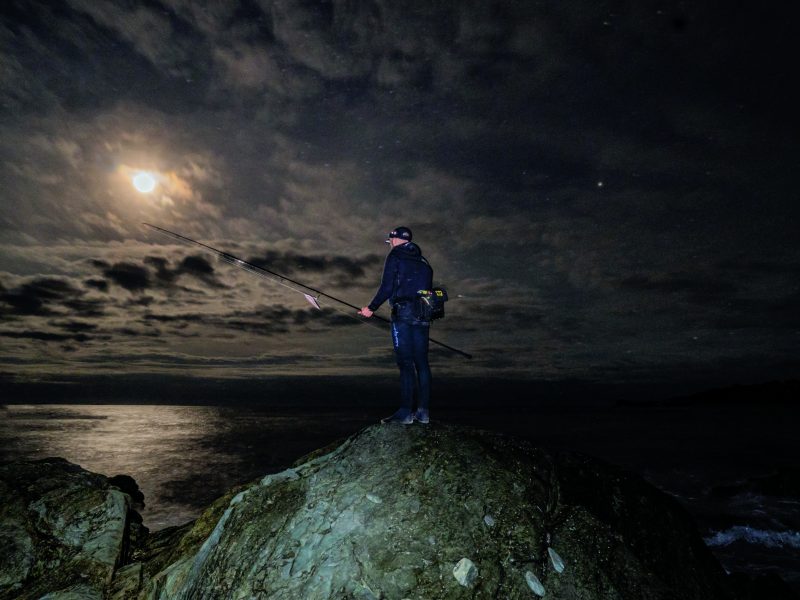
When fishing is good, decisions are easy. In fact, you don’t have to make any decisions when fish are boiling in front of your feet and hitting everything you cast. However, those days and nights are so rare that they often don’t come around more than once or twice a season. If you’re trying for consistent success or to increase the number of big fish you catch, deciding where, when, and how to fish can get complicated. There are so many factors to integrate and details to keep track of that it can feel overwhelming. As someone who fishes six days a week, seven months of the year, all up and down the striper coast, I simply cannot remember and track all the information I need to be highly successful each season. This is where a fishing log becomes a powerful tool – a journal, chart, or even a spreadsheet listing all your fishing trips and associated factors related to your success (or failure).
I have so many examples and stories of how my log has helped me catch more fish that I could write a book on the subject. Reviewing my log each week helps me develop a plan and reminds me when and where I need to be for the most important tides. It assists me in analyzing successes and failures, and to identify patterns I wouldn’t notice working solely from memory. It also helps me collate and solidify the details of plug selection and presentation, and often motivates me when I need to be pushed out the door. Finally, it’s as much a journal as it is a log, which I can nostalgically read in the depths of winter. I cannot stress enough the importance my log has had on my angling success. In fact, it’s also had a significant impact on my life since it’s a written history of my fishing passion.
Starting a Fishing Log
Getting started with a log is by far the hardest part, though once I got in a rhythm and found what worked for me, it got easier. Like other routines, if you can establish a reliable, standardized method and stick with it for at least three months, it should become a lifelong skill. You can make it as complicated or simple as you want.
I now enjoy logging because it’s become a powerful and rewarding tool for increasing my fishing success. I have discovered patterns I would have missed otherwise. For example, I now know I’ve never, ever, caught a fish on a waning moon in one of my spots. I would not have realized that without the log; it is just too nuanced. I’ve even discovered an extremely small, 15-minute window that produces my best fish every moon, every month, every year, at one of my locations. I might have eventually noticed that, but I think reading my log helped me discover this secret much more quickly.
There are lots of ways to keep a log. Traditional handwritten documentation works just fine, though I recommend some kind of electronic log. Notebooks are hard to analyze once you have a few years to sift through. I made the transition from notebooks to John Skinner’s program called Fishers Log, and it has been much very useful. The ability to sort and pull out statistics and patterns is extremely powerful, and the program is so inexpensive that it’s worth giving a try. However, the problem for me now is the program doesn’t seem to work very well on high-resolution monitors or modern Microsoft operating systems. Therefore, I’ve switched to a simple Microsoft Excel spreadsheet, which I still find very effective, easier to use, and far simpler to view across devices. While it doesn’t offer some of the fancier analysis tools John’s program does, it’s more than enough for my purposes. Whatever you decide to use, if it’s electronic, make sure you keep more than one backup version. I use my computer and take advantage of cloud storage.
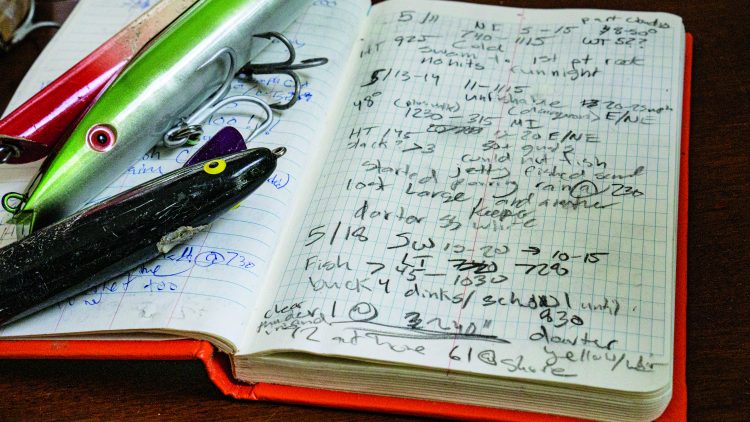
One of the best tips I can give you from my own experience is to log as quickly as possible after fishing. Letting it go even a day or two can mean forgetting important details. I always make at least a few notes the day I fish, no matter what, using a note-taking app on my phone. When gearing down or right before I start the drive home, I use speech-to-text to record some bare essentials. Then, once a week, I review my notes and record more details in the log on my computer.
Logging the Essentials
Before I list what I consider essentials for logging, I think it’s important to raise the issue of honesty. Your log is only as good as the information that goes into it. “Crazy” Alberto Knie raised this point once in a seminar I attended, and I was surprised to hear a couple of anglers openly admit they lied in their own logs! No one will ever see your log (unless you show them); therefore, why have any hang-ups about recording the truth? A log takes time and effort, which will be wasted if you’re not honest.
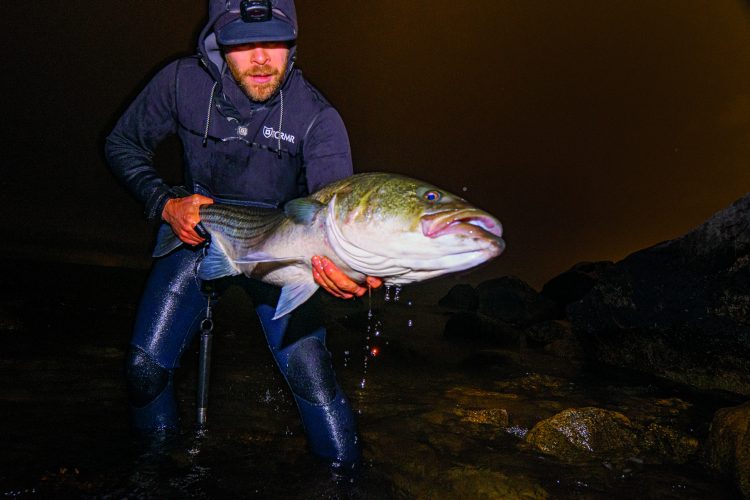
I break the factors that I include in my log into essential data and bonus information. The essentials include ranking the trip, date, time I fished, tide stage, general moon phase, air temperature, water temperature, wind direction and speed, wave height, number of fish caught, and any exceptional fish sizes. Without any one of these factors, my ability to analyze the trip is partially compromised.
The next important factor is to make a few long-form specific notes. Sometimes I may only write a sentence; other times, I might write 1,000 words, but most of the time it’s a short paragraph. I include observations about water clarity, the plugs or flies I caught the fish on, how the fish were behaving, and any bait that might be in the area. As for bonus information, I try to include the type of waves (wind chop or storm swell), any wind gusts, barometric pressure trends, and tide height. These are not essential, but provide additional details that have helped me find patterns over the long term.
I also use a ranking system that lets me quickly sort and examine the best nights and the worst nights, comparing data between them. I adopted Skinner’s method of ranking my trips from one to five. If you’re using an Excel document like I do, you can quickly sort your trips. Reading over the highly ranked nights, you can pick apart any important details. Hypothetically, perhaps you notice that on most four- and five-ranked nights, you were fishing under a southwest wind. Or, you notice most one-ranked nights were during outgoing tides. The ranking system helps you quickly pull out these observations, then you can focus on southwest winds and incoming tides.
I reserve my lowest and highest scores for the very worst and best nights. Overusing very high scores waters down the most important factors, making it hard to observe patterns and act on them. Looking over my log from last year, I had 11% of nights ranked a 5, and 32% ranked a 1, meaning 55% of my nights ranked a 2, 3, or 4. I think those numbers are a very accurate representation of my season.
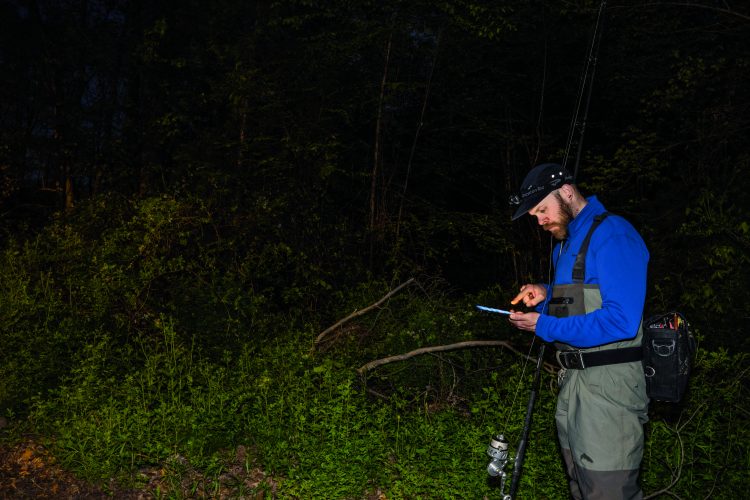
One more important tip about using a ranking system: Don’t make it too complicated. I attempted to use a 1 to 10 scale for part of a season and had trouble deciding what rank to give each night. Even a one to five system can be tough for me to decide on some nights. To keep things really simply, using a 1-4 (or even a 1-3) scoring system could be effective for the average angler.
Motivated by Logging
One aspect of a log that I think gets devalued is how motivating it can be. During hard times, those weeks when I just can’t drag myself out of bed for a late tide, I love looking back over my logs. I specifically read about the good times, the remarkable catches and the surprising ones. The log gives me hope because it is a written record of how rewarding, fun, and special some nights can be. For better or worse, the good nights are often more accurately documented than the bad ones because I tend to add more information about those special nights, so there’s a lot to read, but there is power in tracking the bad times as well. As fishermen, we tend to remember only the good times, often embellish them, and then wipe most of the bad details from memory.
But the log doesn’t lie, as long as you accurately and honestly document every outing. Mine is loaded with skunks and hard tides, and it often helps me stay motivated to take note of this. I may think I used to catch more fish in September—and in the current state of the fishery, that is certainly true. However, it wasn’t always sunshine and rainbows and dozens of 30-pounders as I might prefer to recall it; instead, the log keeps me grounded. Every year, there are hard patches, and every year I somehow break out of them. Having a record of all the bad times pushes me to work hard and stay focused.
A Journal of Your Life
I would be remiss if I didn’t add one very important point. My log is not just a source of data and decision-making. It is also documentation of my life, not just as a fisherman, but also as a person. In truth, calling it a log is a misrepresentation. Instead, my log has evolved into a journal, or, perhaps even more accurately, a series of vignettes capturing the larger arc of a life spent pursuing a passion.
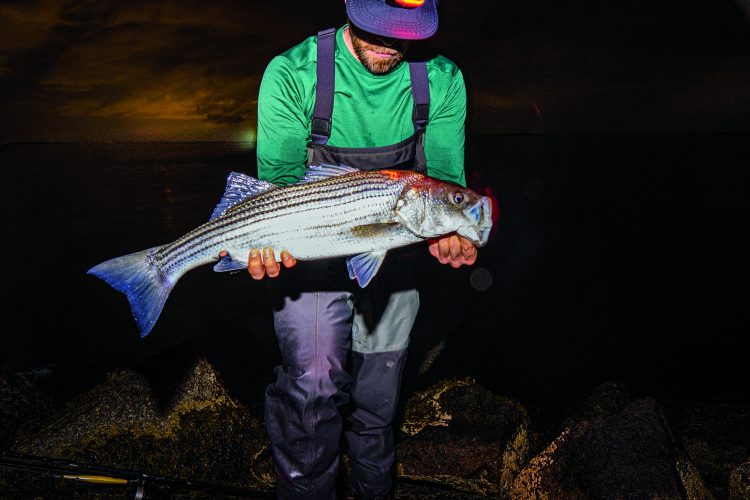
In addition to recording my catch statistics, I include anecdotes about what is happening in my life outside of anglings. Often, these are just quick notes, but they trigger deep, rich memories of major life events, such as moving into a new house, getting a new puppy, starting a new job, losing a friend. These are all documented in my log. After all, these big events (good and bad) have impacted how much I fish, where I fish, and (often) my success since I tend not to do as well if I’m distracted.
Therefore, as I have evolved as a fisherman and as a person, so has my log. My life as an angler is inseparable from any other aspect, so I now take the time to add in more details than I did 12 years ago – details about the world I am living in. These aren’t long-form paragraphs or hundreds of words, just a few sentences sprinkled in each time to provide context. It’s incredibly gratifying to read back over happy events, to feel the pleasure in the words I wrote at the time. However, it’s even more powerful to look back at difficult times and see how I persevered and fished through them, successfully or not, and know I can do it again when times get tough. Because times will get tough again, because that is life and that is fishing.
Leave a Reply